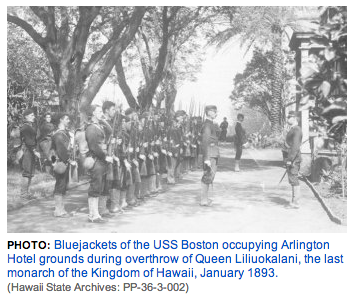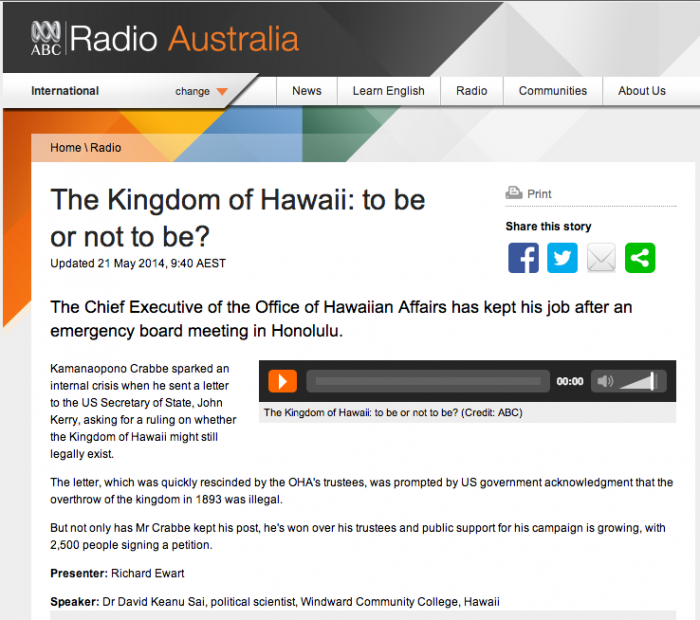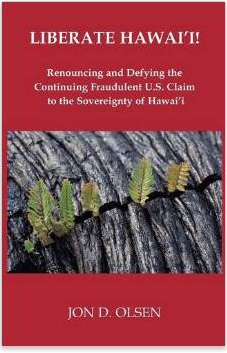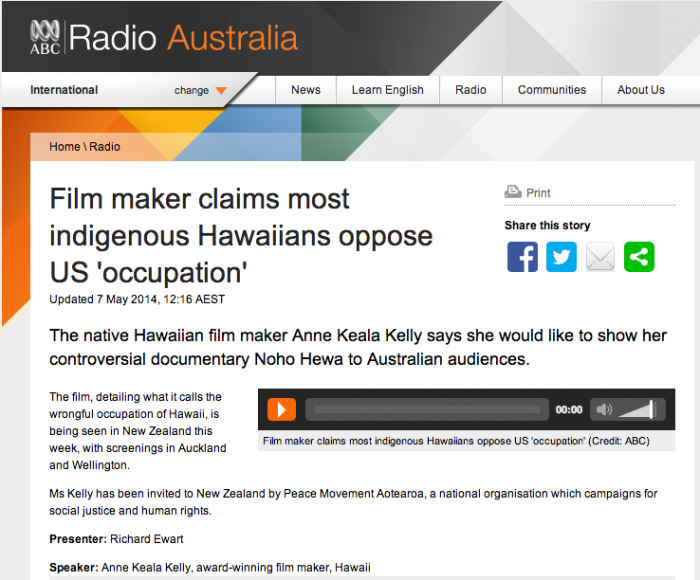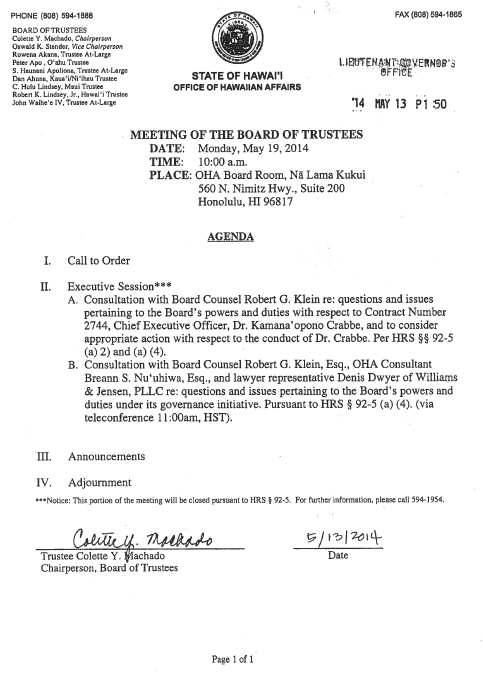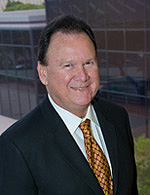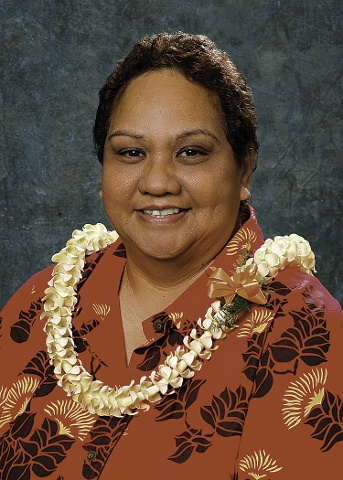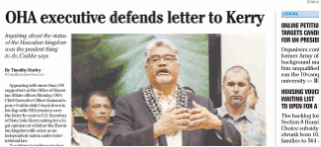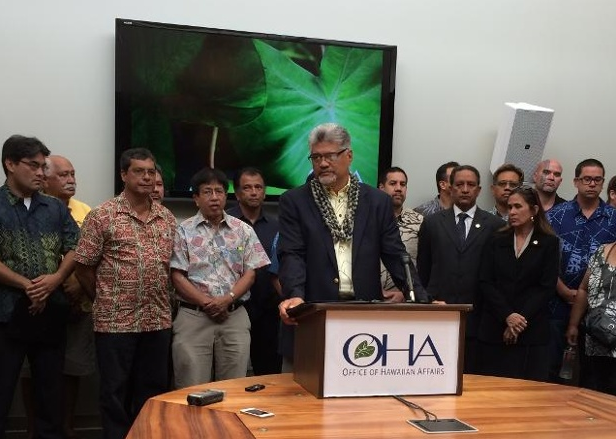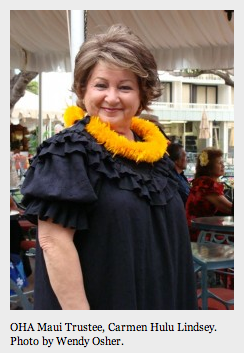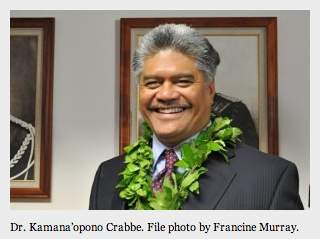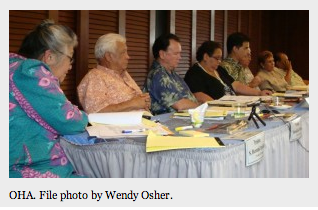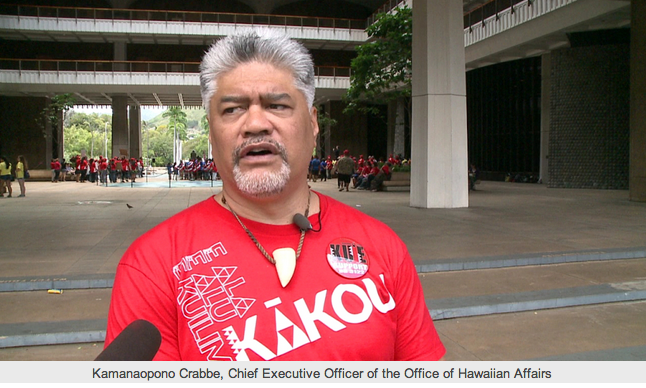Three complaints have been filed this week with the Office of Information Practices alleging the Office of Hawaiian Affairs Board of Trustees (BOT) violated the State of Hawai‘i Sunshine Law. The first complaint was filed anonymously, but the other two were not filed anonymously. The other two complaints were filed by Donovan Preza and Nanci Munroe that cite sections of the Office of Information Practices Guide to the Sunshine Law for State and County Boards.
The complaints center on the May 9, 2014 rescinding letter the BOT sent to Secretary of State Kerry that had all nine Trustees signatures.
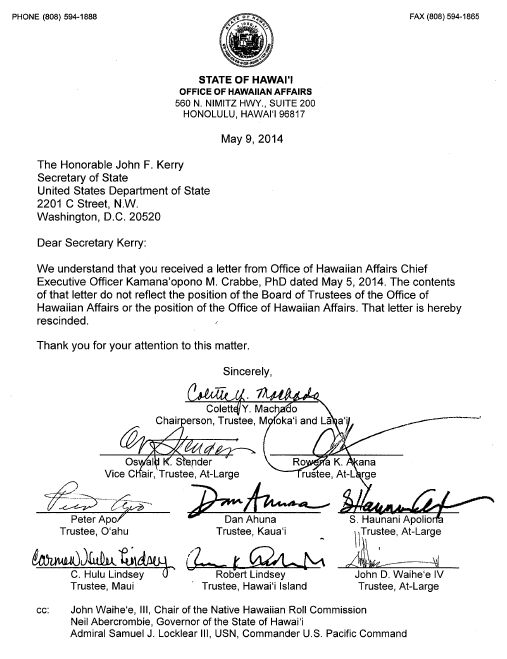
Investigation of complaints are handled either by the State of Hawai‘i Attorney General or any of the Country Prosecutors. Willful violation of the Sunshine Law is a misdemeanor. Hawai‘i misdemeanors are crimes that carry a maximum sentence of no more than one year imprisonment and a fine not exceeding $2,000, and removal from the Board.
COMPLAINT BY DONOVAN PREZA
I, Donovan Preza, resident of Hawai‘i and Native Hawaiian, am filing this complaint with the State of Hawaii Office of Information Practices asking for an investigation into the Office of Hawaiian Affairs (OHA) Board of Trustees (BOT) compliance to the State open meetings law, Hawai‘i Revised Statutes (HRS) Chapter 92, Part I, commonly known as the “Sunshine Law”. The substance of this complaint is to cause an investigation by (OIP), which has jurisdiction over OHA’s BOT, into the actions taken by the BOT of OHA in regards to the May 9, 2014 letter (see email attachment) and to determine if proper protocol was followed in regards to Hawai‘i’s Sunshine Law requiring open public meetings.
On May 9, 2014 a letter was sent from the Office of Hawaiian Affairs (OHA) addressed to The Honorable John F. Kerry, Secretary of State. The substance of that letter and the signatures of all nine members of the Board of Trustees (BOT) of OHA suggest that a meeting took place on Friday May 9, 2014 whereby the BOT conducted business and took an action as suggested in the letter, “That letter [the CEO’s letter dated May 5, 2014] is hereby rescinded”.
It is my understanding that individual members of the BOT were in different locations on Friday, May 9th where the CEO of OHA and Chairwoman of the BOT were in Washington DC. The OIC’s Guide to “The Sunshine Law” for State and County Boards January 2013 (OIC Guide) states, “…with a few exceptions, board members are not allowed to discuss board business with each other outside of a social meeting, including by telephone or through e-mail or social media” (Page 4). As such, the following questions require investigation, 1) Was the board business discussed in the May 9th, 2014 letter with the signature of the 9 trustees the product of a meeting? If so, what specific kind of meeting does the BOT suggest it was (ie: Open, Executive, Emergency, Unanticipated Event, Limited Meeting)? It cannot be considered an “Open” meeting as the requirement for 6 day notice was not met. It could not have been an Executive meeting as the OIC Guide states, “To convene an executive meeting, a board must vote to do so in an open meeting and must publicly announce the purpose of the executive meeting” and there is no evidence of a prior open meeting whereby the BOT voted to delay and resume an Executive Meeting on Friday May 9, 2014. In my estimation a Limited Meeting would also not seem to apply to this situation.
As such I am left to infer that the meeting was either an “Emergency” meeting or a meeting for an “Unanticipated Event”. If it was an Emergency Meeting, then the board would have to show, according to the OIC Guide, that there was “an imminent peril to the public health, safety, or welfare”. The May 9, 2014 letter states, “We understand that you received a letter from Office of Hawaiian Affairs Chief Executive Officer Kamana‘opono M. Crabbe, PhD dated May 5, 2014. The contents of that letter do not reflect the position of the Board of Trustees of the Office of Hawaiian Affairs or the position of the Office of Hawaiian Affairs.” I do not feel that a difference in “position” on this matter constitutes a peril to the public’s health, safety or welfare and as such the board cannot claim that the requirements for an Emergency meeting were met.
The OIC Guide also states, “When the board finds an emergency meeting is appropriate, (1) the board must state its reasons in writing, (2) two-thirds of all members to which the board is entitled must agree that an emergency exists, and (3) the board must file an emergency agenda and the board’s reasons in its office and with the Office of the Lieutenant Governor or the appropriate county clerk’s office”. I have found no evidence of the board explicitly stating its reason or even the public identification of there being an “Emergency” meeting on May 9, 2014. The letter of May 9, 2014 does not provide a reason for the meeting but instead speaks to a reason for BOT actions. Neither have I seen any evidence of the BOT stating that an Emergency existed. Their ability to take such action “behind closed doors” is what is in question here.
Secondly, as mentioned previously, some of the BOT were on different islands and at least one was in Washington DC which suggests that such a meeting would have had to have taken place over the phone or some other form of “interactive conference technology”. Did the BOT convene all together via teleconference, Skype or some other technology? In other words, did all nine trustees, as evidenced by 9 signatures on the letter, meet via “interactive conference technology” as provided for by law or did they meet and discuss individually via telephone conversation or some other form of communication. In the section titled, “Discussions Between Board Members Outside of a Meeting” it states, “The sunshine law generally prohibits discussions about board business between board members outside of a properly noticed meeting, with certain statutory exceptions.” It continues, “…such interactions cannot be used to circumvent the requirements or spirit of the law to make a decision or deliberate towards a decision upon a matter over which the board has supervision, control, jurisdiction, or advisory power. In practical terms, this means that board members cannot “caucus” or meet privately before, during or after a meeting to discuss business that is before the board…” Can individual phone calls, if that is in fact how the meeting occurred, be considered to constitute a proper Emergency Meeting or would it be evidence of a “caucus” or private meeting which the Sunshine Law does not provide for by law. Third, in regards to an “Emergency Meeting”, I have found no evidence of the BOT filing an emergency agenda, as required, as to the board’s reasons in either OHA’s office or the Office of the Lieutenant Governor or appropriate county clerk. In other words, there is no evidence that a meeting took place. And there is even less evidence that a legally constituted meeting took place.
One could also infer that the meeting was an “Unanticipated Meeting”. My general comments and argument to the Emergency Meeting, also applies to an Unanticipated Meeting as applicable. The OIC guide states, “The law defines an unanticipated event to mean (1) an event that the board did not have sufficient advance knowledge of or reasonably could not have known about; (2) a deadline beyond the board’s control established by a legislative body, a court, or an agency; and (3) the consequences of an event for which the board could not have reasonably taken all necessary action. This seems to be the BOT’s best argument but again the May 9, 2014 letter does not articulate or identify the source of authority by which the BOT was acting and it did not explicitly mention that their actions were the result of an “Unanticipated Meeting”. Again the public is left to infer that the alleged meeting was in fact an “Unanticipated Meeting”. My aforementioned argument above starting with the paragraph “Secondly” applies here. Can an “Unanticipated Meeting” be properly called to order considering the BOT were on different islands and would have had to have occurred over the phone or some other form of “interactive conference technology.” I am not questioning the technology or method of conversation. Instead my question focuses on whether the trustees actually had an opportunity to meet all together, as a board, as suggested by the nine signatures on the letter. Is there any evidence that the trustees actually talked to one another as a group or did this occur through conversations between their staff? If the conversations occurred individually between two trustees at a time does this constitute a “meeting behind closed doors”
Additionally, the requirement for an “Unanticipated Meeting” are as follows, “…(1) the board states, in writing, its reasons for finding that an unanticipated event has occurred and that an emergency meeting is necessary; (2) the attorney general and two-thirds of all members to which the board is entitled concur with the board’s finding; and (3) the board’s findings and the agenda for the emergency meeting are filed in the board’s office and with the Office of the Lieutenant Governor or the appropriate county clerk’s office”. As previously stated, the public is left to infer from the letter dated May 9, 2014 that an “Unanticipated Meeting” occurred. I have seen no evidence articulated elsewhere by OHA that such a meeting occurred in regards to this matter. Secondly, I have seen no evidence from the Attorney General suggesting that it concurred with the actions of the BOT to call an “Unanticipated Meeting” in the first place as required by law. Probably because OHA has not publicly stated that such a meeting ever took place. Additionally, the office of the Attorney General is not “cc’d” in the May 9thletter. As the law requires, the attorney general to “concur” with the necessity of the emergency meeting, one would think they would have been a logical entity to cc on the letter. Instead the BOT cc’d John Waihe‘e III, Governor Neil Abercrombie, and Admiral Samuel J. Locklear III, USN, Commander U.S. Pacific command. Third, I have seen no evidence of the “board’s findings” or “agenda” for the emergency meeting either in the board’s office or with the Office of the Lieutenant Governor.
In summary, the IOC Guide states, “the intent of the Sunshine Law is to open up governmental processes to public scrutiny and participation by requiring state and county boards to conduct their business as openly as possible. The legislature expressly declared that “it is the policy of this State that the formation and conduct of public policy-the discussions, deliberations, decisions, and actions of governmental agencies-shall be conducted as openly as possible. In implementing this policy, the Legislature directed that the provisions in the Sunshine Law requiring open meetings be liberally construed and the provisions providing for exceptions to open meeting requirements be strictly construed against closed meetings.” (emphasis mine) It was necessary to articulate all of these arguments because OHA has not publicly provided, to my knowledge, an explanation of when or how the BOT met and held a meeting as suggested by the May 9, 2014 letter and the actions taken by the BOT articulated in the letter. Investigation into these matters outlined above is of critical time significance considering that the agenda of the “Meeting of the Board of Trustees” on Monday May 19, 2014 is to discuss in “Executive Session”, and in consultation “with Board Counsel Robert G. Klein” to consider “appropriate action with respect to the conduct of Dr. Crabbe [CEO of OHA]”. The agenda items for the Monday May 19, 2014 meeting are directly related to the actions and difference of “position” articulated in the letter dated May 9, 2014. Furthermore OHA’s legal counsel Robert Klein apprised the BOT, as found in the minutes of January 13, 2014, regarding potential previous violations of the Sunshine Law by the BOT in issues surrounding the commercial development of Kaka‘ako so the board cannot claim ignorance of the Sunshine Laws. More disturbingly does this suggest a pattern of behavior in how the BOT has been recently operating in relation to Hawai‘i Sunshine laws? In accordance with the Sunshine Laws of Hawai‘i and the OIP’s jurisdiction over such matters I ask that an investigation be started into the matters discussed in this letter. In the spirit of transparency please consider this letter and my name associated with this letter as public record.
Mahalo for your consideration.
Ho‘opa‘a au i ko‘u inoa,
Donovan Preza
preza@hawaii.edu
COMPLAINT BY NANCI MUNROE
Aloha Office Of Information Practices,
I’m writing this e-mail to request that you investigate the Office Of Hawaiian Affairs meeting with the trustees that appears to be in violation of the Sunshine Law.
I’m am NOT a native Hawaiian, but a U.S. citizen, and a resident of the state of Hawai`i since 1976.
This is in regards to the so-called “Rescind Letter” dated May 9, 2014 in which the OHA Board of Trustees demanded that the letter issued by CEO Dr. Kamana`opono Crabbe dated May 5, 2014 to Secretary Of State John Kerry requesting that the State Department investigate the legal status of the Hawaiian Kingdom’s relationship to the United States be rescinded. A copy of that letter is attached.
I am not able to access any information that any minutes were filed in regards to the meeting held on May 9, 2014. The signatures on the letter indicate that a meeting was held and that a vote was taken. There are no minutes to indicate the discussion that was held, what the subject was, or why a vote was taken.
Mahalo for your time,
Nanci Munroe
alohakaneohe@gmail.com
Ph: 808-223-3359


